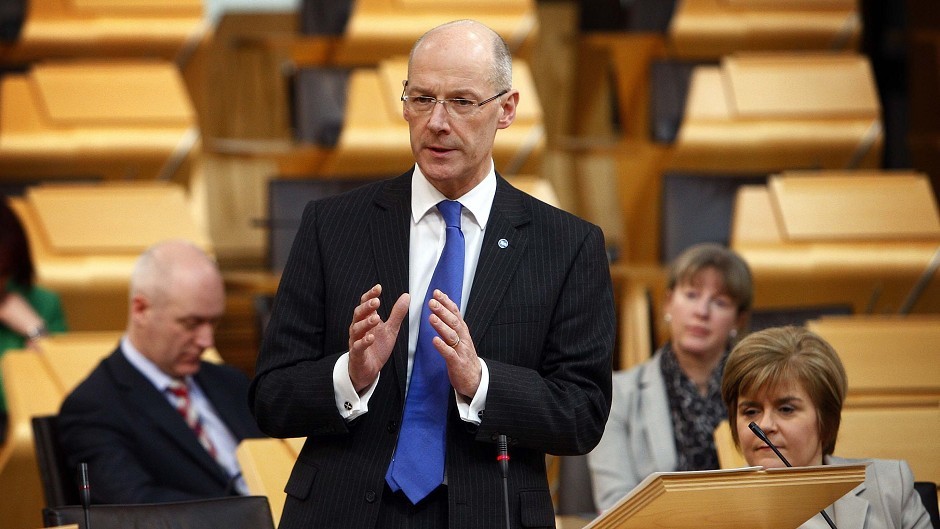The Scottish Government has been accused of launching a “raid on ordinary families” after it announced plans to substantially increase tax on house buyers.
Finance Secretary John Swinney revealed his replacement for stamp duty would mean the levy on the purchase of homes worth more than £250,000 would increase by 10%.
He said the new system was based on people’s ability to pay – and that those buying a house worth up to £130,000 would be exempt from any duty under the Land and Buildings Transaction Tax (LBTT).
According to a recent survey by the Nationwide building society, the average price of a house in Aberdeen is £263,986, and the Scottish average is £162,000.
The Scottish Conservatives’ finance spokesman Gavin Brown accused the SNP of targeting hard working people seeking to buy family homes in what was Scotland’s first tax-making decision in more than 300 years.
He claimed the plans, part of the draft budget for 2015-16 unveiled by Mr Swinney at Holyrood yesterday, were an “assault on aspiration”.
Malcolm Leslie, of estate agent Strutt and Parker, which has an office in Banchory, warned that the “punitive” tax could result in people trying to buy properties before it comes into force on April 1 next year, which means the Westminster government’s coffers would benefit rather than the Scottish Government’s.
Susannah Simpson, stamp duty specialist at accountants and auditors PwC, said the announcement would be welcome news for first time buyers but could have a “negative impact” on prices at the top end of the market in places such as Aberdeen.
Paul Gallagher, tax partner and head of EY Scotland’s government and public sector practice, claimed SNP ministers were effectively proposing a mansion tax – a scheme which had the “potential to tighten the screw on the so-called ‘squeezed middle'”.
Under the LBTT tax, people buying a house valued at £400,000 would pay £17,300 in tax in comparison with £12,000 in stamp duty.
Dues worth £37,300 would be paid on a house with a £600,000 price tag, compared with £24,000 in stamp duty, and people purchasing an £800,000 property would be liable to pay £57,300 rather than £32,000.
LBTT on properties worth £900,000 and £1million would be £67,300 and £77,300 respectively in comparison with £36,000 and £40,000 in stamp duty.
Mr Swinney said that the proposed new regime would take 5,000 additional house purchases out of tax.
He added that no tax would be payable on 45% of transactions, the tax charge relative to stamp duty for a further 44,000 house purchases up to £325,000 would be reduced and 90% of buyers would either pay less or the same amount as they would under current arrangements.
Mr Swinney said: “The old stamp duty was outdated, causing unfair tax hikes, and this led to the market being distorted and led people to try to avoid tax.
“Our proposed residential transaction rates will be more proportionate to the house price, and means that the tax is fairer as it is based more closely on the buyer’s ability to pay.”
The devolved taxes will be collected by Revenue Scotland and are expected to bring in an estimated £558million in 2015-16.
The Scottish Government is proposing to invest £390million to deliver 6,000 affordable homes and provide £125million in additional financial support for the housing sector.
North-east Labour MSP Richard Baker said: “Given the high costs of homes in the region, changing stamp duty to a more progressive tax system, while welcome, may be of limited benefit to first-time buyers in our area.
“Aberdeen has seen the highest house price increases anywhere in the UK outside London and now has the highest average rents in Scotland.”
Mr Brown said: “This is an assault on aspiration.
“John Swinney launched a raid on families who want nothing more than to buy a decent home for themselves and their children.
“It’s not just going to hit the wealthy, it’s also a suburbs tax that will impact many ordinary middle class families.”
